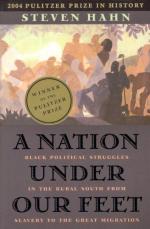
|
| Name: _________________________ | Period: ___________________ |
This test consists of 15 multiple choice questions and 5 short answer questions.
Multiple Choice Questions
1. It appears that little of the interest in emigration spread to _________ areas.
(a) Urban.
(b) Rural.
(c) African.
(d) Midwest.
2. While the incidence of black office holding grew, the party began to grow ____________.
(a) Larger.
(b) Weaker.
(c) Stronger.
(d) Apart.
3. In South Carolina, about 55% of the state legislature was filled by ______________, including many blacks.
(a) Democrats.
(b) Freed men.
(c) Republicans.
(d) Uninformed men.
4. Emigration won support from the educated, ________ free men of color in the North during antebellum.
(a) Rural.
(b) Religious.
(c) Organized.
(d) Urban.
5. Members of the opposition parties would use ___________, intimidation, and violence to induce blacks not to vote.
(a) Bribes.
(b) Jail time.
(c) Violence.
(d) Force.
6. The Klan also attacked local black __________ and school houses.
(a) Stadiums.
(b) Grocery stores.
(c) Drinking fountains.
(d) Churches.
7. It should be noted that Klansmen did not ride without fear of _________ or of meeting resistance.
(a) Unmasking.
(b) Retaliation.
(c) Legal ramifcations.
(d) Lynchings.
8. More than a few reputed leaders argued that the KKK was a _____________ response to the Union League.
(a) Rational.
(b) Necessary.
(c) Unnecessary.
(d) Diastrous.
9. Frederick Douglass argued that emigration amounted to _____________ of other blacks.
(a) A religion.
(b) A necessity.
(c) An abandonment.
(d) An organization.
10. In many areas, the Republican Party failed to attract enough ________ voters.
(a) Free.
(b) Legal.
(c) White.
(d) Black.
11. "Under the best of circumstances, white _____________ embraced the ideals of civil and political equality."
(a) Republicans.
(b) Preachers.
(c) Democrats.
(d) Slaveholders.
12. The KKK was build on enforcing racial ________ and submission and on legacies of military defeat.
(a) Rule.
(b) Servitude.
(c) Domination.
(d) Collaboration.
13. The KKK complained that freed slaves were organizing and were accumulating arms, holding ____________, and threatening mobilizations.
(a) Bake sales.
(b) Secret meetings.
(c) Elections.
(d) Militia training.
14. The young white men who were attracted to the KKK were once members of the _______________.
(a) Planations.
(b) Landowner's associations.
(c) Confederate Army.
(d) Government.
15. When a black man vied for office, it required the mobilization of entire ________________.
(a) Communities.
(b) States.
(c) Plantations.
(d) Churches.
Short Answer Questions
1. In some areas where based of substantial black political activity existed, an arrangement known as ________ occurred.
2. The ________ attacked and murdered local leaders and organizers, intimidated party supporters, and tried to force out objectionable office holders.
3. Emigration sentiment seemed to be most powerful in areas where freed people labored on ____________.
4. Black misgivings were often confirmed at a local level, where some Populists resorted to ____________.
5. Lynchings were rare in areas where a community had been created and where there was some local __________.
|
This section contains 388 words (approx. 2 pages at 300 words per page) |

|




